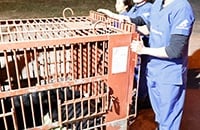Western tourists risk fuelling animal cruelty in Vietnam
13 March 2014

Thrill seeking western tourists fuelling the cruel consumption of wildlife in Vietnam are being targeted by Animals Asia.
The animal welfare NGO is producing leaflets targeting foreign visitors to Vietnam’s tourism hotspots as part of efforts to limit cruelty and ensure wider work to limit the use of animal parts for medicinal purposes are not undermined.
The Leonardo Di Caprio movie "The Beach" based on the backpacker best seller of the same name helped popularise the drinking of snake blood and the eating of its “still beating heart” as a backpacker rite of passage. Since then, for increasing numbers of tourists, a vital part of a trip to the north of Vietnam has included a visit to the notorious Snake Village.
There it’s common for young backpackers to drink snake blood or bile liquor and swallow hearts of various snake species killed and gutted in front of them by their waiter. The activity is so popular that many of Hanoi’s backpacker hostels offer frequent excursions for customers with snake blood and bile liquor said to enhance virility.
Differentiating farmed snakes from those caught in the wild is extremely difficult, making it all but impossible to verify restaurants’ claims that their animals are farmed. Reports suggest that additional wild caught and endangered snakes can also be bought, as can other at-risk species.
In many cases, snakes used in tourist shows at “snake villages” have had their venom glands removed. This is usually done without anaesthesia, in non-sterile conditions, and can cause chronic infection resulting in significant suffering and death.

In addition, consuming snake is highly risky to human health. All reptiles carry salmonella and this can be contracted by ingesting raw snake. Snake-steeped wine is produced by infusing whole raw snakes in rice wine or grain alcohol. The wine is sold as a cure for numerous ailments from rheumatism to impotence, with no evidence of any curative qualities. In some cases, to save money, producers bottle the snakes in ethanol or even formaldehyde, posing serious risk to human health.
To arm visitors with the information required to make an informed choice as to whether they really want to take part in such a ritual - Animals Asia has produced leaflets specifically targeting young western thrill-seekers. These leaflets have been placed in bus stations, hotels and travel agents frequented by foreign backpackers.
The leaflets, published in both English and Vietnamese, implore readers not to consume snake heart or snake blood and bile liquor or to visit snake farms. The information also advises tourists not to get involved in traditional cock fighting or attend animal performances.
Nguyen Tam Thanh, Animal Welfare Officer for Animals Asia said:
“Many young tourists come to Vietnam and think that this kind of activity is part of Vietnamese culture. This is not part of modern Vietnam and the fact that it survives at all is largely down to the tourist trade.”
Animals Asia Animal Welfare Director Dave Neale said:
“It does Vietnam a great disservice to have this sold to tourists as Vietnamese culture. In our wider work we are fighting hard to end the use of bear bile farming and the cruelty that comes with it. That campaign is undermined by tourists and tourism organisations paying to consume bile in whatever form. We have some sympathy with practitioners of ancient medicine who we are working with to encourage them to use herbal remedies over bile. We have less sympathy for visitors using snake bile for so called ‘extreme eating’ or travel tales to share with friends. Hopefully the information we are making available will make visitors think twice. What might be sold to them as local culture may actually be organisations cashing in on cruelty."

BACK




 New year, new home for Christmas the Bear!
New year, new home for Christmas the Bear!
 Veterinary welfare training – pain management
Veterinary welfare training – pain management